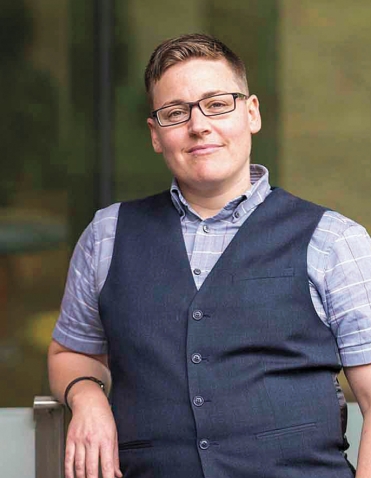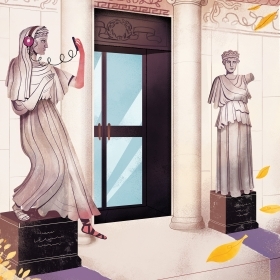Photo by Richard Howard
We spoke with Assistant Professor of Music Kaleb Goldschmitt—an ethnomusicologist and a scholar of popular music of the Americas, especially Brazil—about the Rio Olympics, Barry White, and why Taylor Swift might not be so bad.
What’s the difference between a musicologist and an ethnomusicologist?
When it comes down to it, musicologists are going to think about music as culture through texts in history. So they’re going to look at scores. They’re going to look at archives. They’re going to look at discourse. Ethnomusicologists can do that, but they’re also going to look at what people say to each other, and they’re going to look at music as a social event, so music as performance, music as ritual.
What did you think of the opening and closing ceremonies at the Olympics in Rio?
It was so good. It was so diverse. It spoke to what I’d say is a much expanded vision of how Brazilian music represents the country abroad. … They managed to show the richness of the traditions of Brazilian music. So there were some allusions to samba, of course, and to [Brazilian singer-songwriter] Tom Jobim, for example, and to a really famous protest singer-songwriter named Chico Buarque. … And in the closing ceremonies, they had a really famous pop singer doing a Carmen Miranda impersonation while all of the nations came in. And then they had forró music, which is country music. But then—watching the way Western media, especially from the U.S., was portraying Brazil, it was heartbreaking, pretty much nonstop: “Look at all this crime, look at all this robbery.” Why was that the focus?
What’s one of your favorite pop songs to teach?
When I teach disco, which I’m teaching in both of my classes this semester, I always teach Barry White. He led this group called Love Unlimited Orchestra before he was a solo artist. And there’s this amazing song called “Love’s Theme.” There are no vocals, and it’s this additive structure where you keep on hearing new things being added on. And it’s not that different from ragtime in terms of what it’s doing structurally. And it’s so lush.
What misconceptions are there about being a music scholar?
There’s a preconception out there that if you’re a music scholar, you’re a snob, right? That you have really discriminating tastes. I see my mission as teaching students that they have the ability to be good listeners without proper musical training, that their perspective is valid, their tastes are valid, because part of being an ethnomusicologist is seeing the cultural value of different perspectives. … Right now, Taylor Swift is on the outs in social media, but if you love her, yes, go ahead and love her.








We ask that those who engage in Wellesley magazine's online community act with honesty, integrity, and respect. (Remember the honor code, alums?) We reserve the right to remove comments by impersonators or comments that are not civil and relevant to the subject at hand. By posting here, you are permitting Wellesley magazine to edit and republish your comment in all media. Please remember that all posts are public.